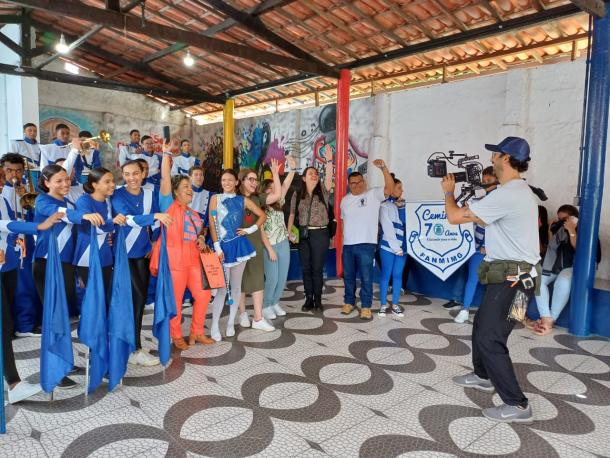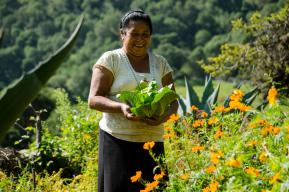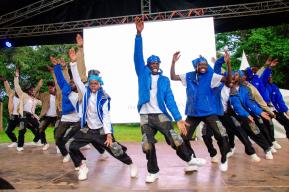The trajectories of two Brazilian students, who participated in the #EDUCASTEM2030 project and in the first group of the MOOC UNESCO Young STEM Leader 2030 course last year, will be part of a documentary produced by Chinese TV CGTN in partnership with UNESCO. Entitled "Her", the film will show how girls from different countries worldwide have overcome barriers and difficulties to embark on the so-called STEM areas (Science, Technology, Engineering, and Mathematics).
In addition to the two Brazilian girls, this audiovisual production will also present the life stories of a girl from Tanzania and another from Pakistan. The documentary is scheduled to be released in France in October 2023.
The course is an initiative of UNESCO in Brazil, developed within the scope of the pioneering #EDUCASTEM2030 project, aimed at encouraging the participation of girls and women in STEM areas. The project developed teacher training courses (UNESCO Leading Teacher STEM2030) and student training (UNESCO Young Leader STEM 2030), with a view to breaking barriers, prejudices and gender stereotypes for the inclusion of girls in STEM areas.
Tainá Caldas, from Ilhéus, and Fabiana Machado de Souza, from Catu, both currently 19 years old from the State of Bahia, faced numerous socioeconomic and emotional difficulties accessing their right to quality Basic education. Both Tainá and Fabiana, with the support of quality school management and their families, in addition to the encouragement of the course offered by UNESCO, managed to break gender prejudices and achieve their dream of enrolling in an engineering course.
Tainá is currently studying production engineering at the State University of Santa Cruz in Ilhéus (Bahia). The young woman from Bahia remembers that she suffered racist bullying when she entered elementary school, which affected her emotionally and made her lose confidence and motivation to study. Still, she reacted thanks to a teacher and family's support. After participating in the course, Tainá saw her perspectives change even more.
The UNESCO course transformed me. It was decisive for me to take a course in the exact sciences. Even though I've always liked the exact sciences since I was a little girl, I didn't see myself pursuing a profession in these areas. But it was in the UNESCO course when we were introduced to inspiring Brazilian women like the astrophysicist Eliade Lima, whose life stories and overcoming challenges were very similar to mine, that I felt motivated to choose a course in exact sciences. It gave me motivation. There I could see people, women, who were shining in exact sciences. The course made me believe in my potential and made me look at society differently. It brought me a boost; the course involved me completely. I loved my experience with the course. I was able to show my knowledge and receive knowledge.
Innovatively, this UNESCO project also put young students in contact with successful Brazilian scientists in these areas. For Fabiana, who spent her childhood in rural areas and is now a production engineering student at Faculdade do Santíssimo Sacramento in Alagoinhas, Bahia, the course taught her much about equality and equity. In addition to having the opportunity to learn about different trajectories of inspiring women who work in STEM areas, they developed innovative projects and made discoveries.
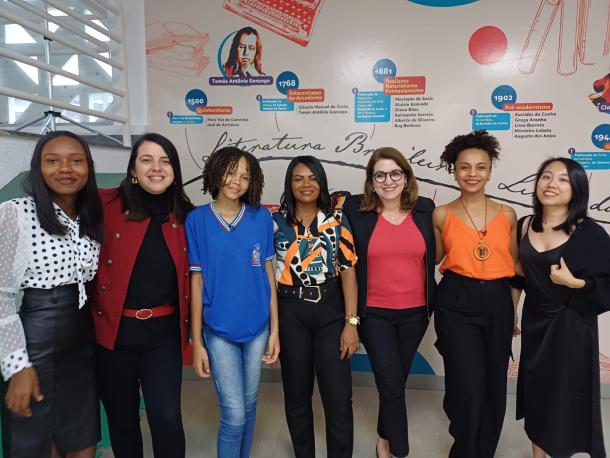
I never forget the inspiring woman, black, from Bahia, Jaqueline Goes de Jesus, who was one of the first scientists to sequence the SARS-COV-2 genome at the very beginning of the pandemic, fundamental for the production of vaccines.
Fabiana recalled Jaqueline as her inspiration when she was taking the national university entrance exam. Fabiana passed the exam in six different universities for graduate courses in the STEM areas.
Scientist Jaqueline Goes de Jesus is one of the inspiring Brazilians who UNESCO in Brazil invited to have their successful STEM trajectories presented in the course and educational materials of the #EDUCASTEM2030 project.
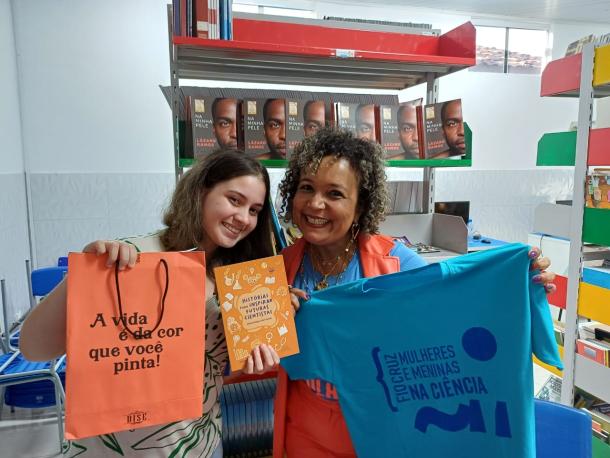
The #EDUCASTEM2030 project in Brazil was implemented in the second half of last year in partnership with the State Secretariats for Education in Bahia and Pernambuco, reaching around 800 students and teachers from the state systems. In the project's second phase, the forecast is to offer the course to other Brazilian states.
In addition to the girls, the CGTN team interviewed the UNESCO Representation team in Brazil, their families, teachers of Basic Education and the universities where they study, the secretary of Education of the State of Bahia, Adélia Pinheiro, and the scientists who served as inspiration for girls to pursue STEM careers: Jaqueline Goes de Jesus, Helena Araújo, Erilsa Braz dos Santos and Eliade Ferreira Lima.
